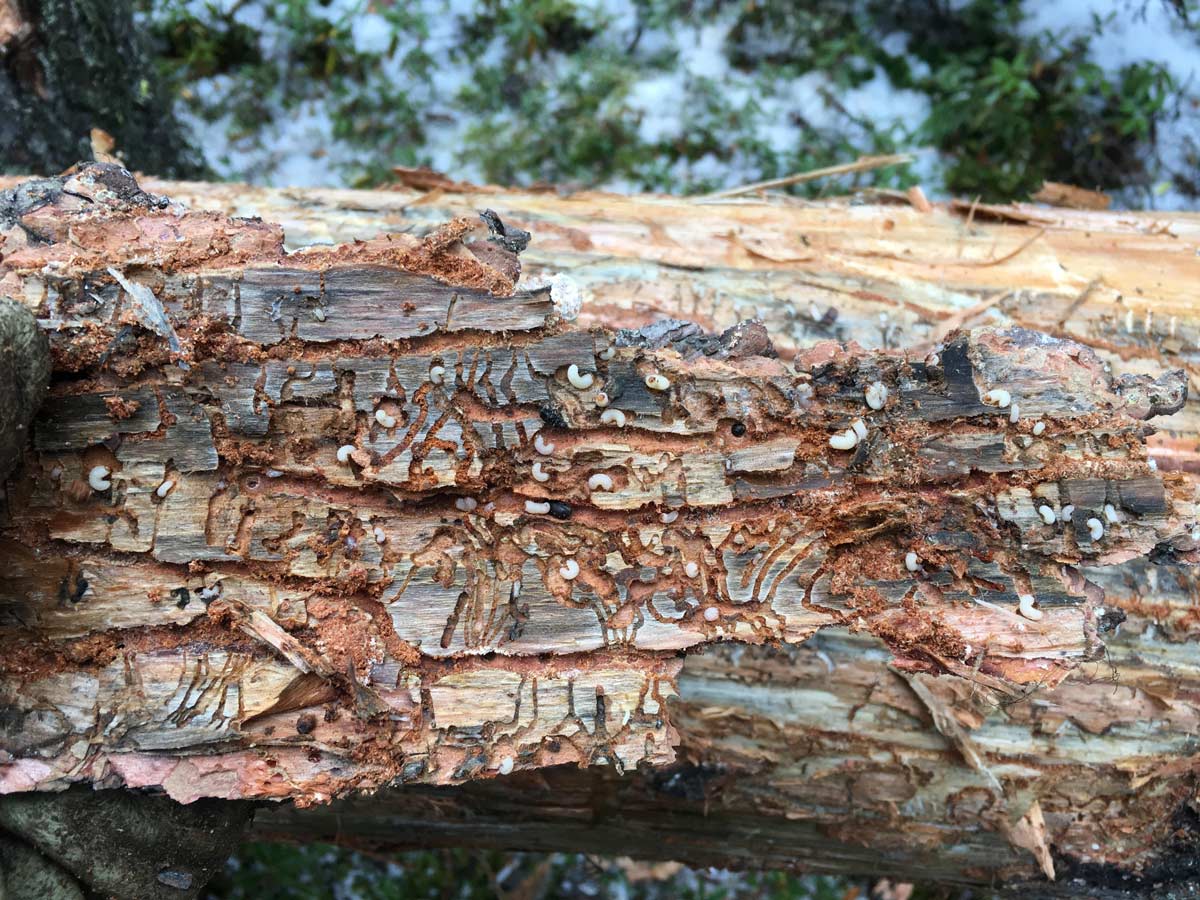
Pine beetles and larvae scattered along the bark of a pine tree. Scientists are attempting to find and generate various strains of fungi that can effectively kill pine beetles and save mountain pines from further devastation. Photo credit: Janice Cooke.
With temperatures soon set to spike on another Canadian summer, so too will we soon see an activity spike by some of the deadliest invasive species infecting and killing Canadian pines-the mountain pine beetle and western gall rust. While scientists have long been focused on targeting and executing a critical counter attack, they have just received a major funding infusion to amplify their efforts, with support from the Natural Sciences and Engineering Research Council of Canada's (NSERC) Strategic Partnership Grants program.
Fungal strains to save the pines
John Vederas, professor in the University of Alberta's Department of Chemistry, is focused on beating deadly beetles at their own game, infecting mountain pine beetles with a fungal strain, similar to the attack that the beetles themselves execute with devastating consequences to pines in western Canada's forests.
"The goal of the project is to find and generate strains of a fungus-Beauveria bassiana-that effectively kill mountain pine beetle," said Vederas, principal investigator on a project that has just received $687,700 to target biocontrol of the invasive species.
"This bark beetle has already devastated many pine trees west of the Rockies and has now crossed over and attacked Alberta forests," continued Vederas. "In addition to being resistant to sunlight and drought, the fungal strains should be selective for the pine beetle in comparison to beneficial insects. One proposed approach to target the beetle is to have its aggregation and sex pheromones, or chemical attractants, produced by the fungus. In this manner, lethally infected beetles become attractive to non-infected beetles and help save the pine trees by targeting and spreading the beetle infection."
Vederas will be collaborating with mountain pine beetle expert Allan Carroll and Jörg Bohlmann, expert on insect pheromones, genetics, and molecular biology. Both Carroll and Bohlmann are professors at the University of British Columbia.
Genomics to regenerate pine population
Janice Cooke, professor in the University of Alberta's Department of Biological Sciences, is unwavering in her scientific efforts to eradicate the impact of invasive species on our forests. And she has just been awarded more than $619,000 to use genomics to discover resistance mechanisms and develop new tools for tree breeding to combat western gall rust, a fungal disease affecting pine trees.
"Regeneration of our pine forests in western Canada is a timely topic, since over the last several years, millions of hectares of lodgepole pine forests in western Canada have been lost to large-scale disturbances like mountain pine beetle and forest fires," said Cooke.
Cooke explained that the young trees regenerating in the wake of the devastation are more susceptible to this fungal disease, leading to infection, stunted growth, deformity, and death.
"Our goal is to harness the power of genomics technology to try to find DNA markers for lodgepole pine resistance to western gall rust. If we can succeed in finding these DNA markers, this provides forest practitioners with a useful tool to screen trees for resistance to this pathogen, rather than have to go through the time intensive process of manually screening trees. This screening would permit more seedlings with increased resistance to western gall rust to be planted on the landscape."
Cooke is collaborating with Rong-Cai Yang from UAlberta's Faculty of Agricultural, Life & Environmental Sciences, and others colleagues from Alberta Agriculture and Forestry, Natural Resources Canada, the Canadian Forest Service, Delta Genomics, and Canadian Forest Products.
The potential impacts for both Vederas and Cooke's projects are critical, given that a sustainable, predictable timber supply is vital to maintain the competitiveness of Canada's forest industry.
"Healthy forests are vital components of healthy ecosystems," said Cooke. "Whether we live in urban or rural environments, Canadians have a strong, almost visceral attachment to our forests. Selecting trees that are more resistant to pests and diseases using tools that don't compromise genetic diversity provides one piece of the big puzzle of increasing forest resiliency."
The goal of NSERC's Strategic Partnership Grants is to increase research and training in targeted areas that could strongly enhance Canada's economy, society and/or environment within the next 10 years. Research and training under these grants is conducted through a partnership between academic researchers and industry or government organizations.